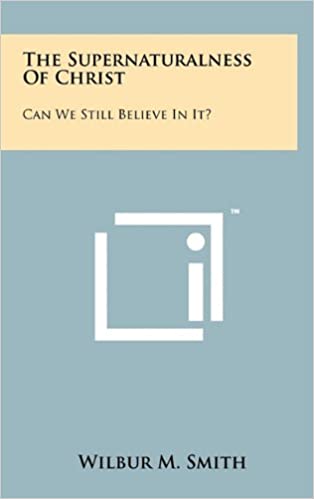A Brief Book Summary from Books at a Glance
By Justin Powell
About the Author
Wilbur M. Smith (1894-1976) was ordained as a Presbyterian minister in 1922 serving as a pastor until 1937. In 1932, Smith received a Doctorate of Divinity from Evangelical Theological College (now Dallas Theological Seminary). Charles Fuller asked Smith to help found the Fuller Theological Seminary. From 1947 to 1963, Smith delivered lectures in theology and Biblical Studies. He is also author of numerous books, including his opus, Therefore Stand, a 600-page volume on Apologetics. Smith called himself a fundamentalist, even resigning from Fuller over doctrinal disputes concerning the inerrancy of Scripture.
Overview
Table of Contents
1 The Denial of the Supernatural in Contemporary Thought
2 The Historical Trustworthiness of the Gospel Records
3 The Supernatural Elements in the Birth of our Lord
4 The Miraculous Works of Christ
5 The Unique Transfiguration of Christ
6 The Historical Reality of Christ’s Resurrection
Epilogue
Summary
Chapter 1. The Denial of the Supernatural in Contemporary Thought
The condition of modern thought in regards to supernaturalism can be summed up in Professor J. D. Bury’s History of Modern Thought which reads, “During the last three hundred years reason as been slowly but steadily destroying Christian mythology and exposing the pretensions of supernatural revelation.” It is reasonable to concede to the conclusions of highly educated and skilled scholars, however, despite the numerous scholars who share Bury’s conviction, few offer reasons to reach this conclusion. Likewise, Dr. Harry Elmer Barnes, lecturer and professor of sociology, author of numerous books, and undoubtedly one of the bitterest antagonists of Christianity in the 20th century, begins his work The Twilight of Christianity with a sweeping denial of anything supernatural. He writes,
We are now in a possession of a body of knowledge and a resulting set of intellectual and social attitudes which offer a complete challenge, not merely to Orthodox Catholicism or Fundamentalist Protestantism, but to supernatural religions of every sort…the premises of the old supernaturalism have completely evaporated (6).
It is without a doubt Christianity is a supernatural religion. Supernatural can be defined as “that which is above or beyond natural.” It presupposes the existence of a personal God and the existence of a real order to nature. There must be order to nature for something to be beyond nature. Likewise, anything that exists beyond the natural world and the spirit of man must by definition be God. Supernaturalism then is the belief that some events in history can only be accounted for by the existence and actions of God. But what exactly are the reasons for such denial? Despite the widespread denial of supernaturalism, only a small number of opponents offer reasons behind their denial.
First, “the size of the world in space and its duration in time have been extended beyond all resemblance to the dimensions accepted by the Church Fathers.” The answer to this critique is two-fold. One, the Bible’s chronology has nothing to do with supernaturalism. The Bible is not meant to be a scientific textbook, and its statements on astronomy are quite elastic. Two, the subjects of Heaven and Hell are not dependent on the miracles in the gospels. However, if there is no God then there is no Heaven or Hell, but if Jesus is the supernatural manifestation of God, then one should certainly listen to the exhortation from Heaven, “This is my Beloved Son, hear Him.”
The second reason is the “indifference of [nature’s] structure and processes to us and our planet” (14). This reason does not keep to the truth of things. The air does not sting our lungs. Water quenches thirst. Though it is necessary to eat, is it not a delight if well-prepared? Nature is both lovely to observe and has the ability to heal, even if a surgeon is necessary. Professor Lawrence Henderson has a helpful book, The Fitness of the Environment, which smashes this argument.
The final reason is the consistent growth of knowledge of the mechanics of life which transform the necessity of supernatural reasoning with natural explanations of causes. The inference is that as more is learned regarding the mechanics of life, then supernatural explanations will eventually disappear altogether. However, the mechanistic view of the world is hardly an accepted conclusion in the sciences, even among non-believing scientists. Professor J. S. Haldane, Reader in Psychology in Oxford University, President of the Institute of Mining Engineers, and outstanding member of the Rationalist Press Association of Great Britain, presents the dilemma for a purely mechanical worldview. The nature of life is to reproduce itself within an entire system, and if one part is removed then its ability to maintain and reproduce is lost.
[To continue reading this summary, please see below....]The remainder of this article is premium content. Become a member to continue reading.
Already have an account? Sign In
